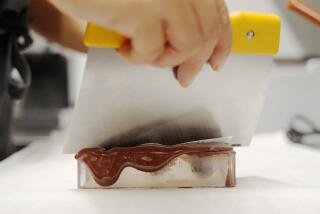Is Chocolate Healthy? Hold the Snickers
- Share via
Note to self: Get an earlier jump next year on the American Chemical Society’s national convention. Where else could I have found out this week that chocolate may actually be good for you and that caffeine ain’t bad either?
Sadly, nothing new on cheeseburgers and fries.
The chemical society has wrapped up several days in Anaheim, but it took lazy old me all week to get there.
But noontime Thursday, I’m sitting at a table in the Hilton Hotel with a man telling me that chocolate, despite everything we’ve heard about its fat content, may be good for your heart.
Uh, did I mention he was from Mars?
No, really. He’s Harold Schmitz, a chemist with Mars Inc., the New Jersey company that makes M&Ms; and other delights.
Yeah, I know--a candy man touting chocolate’s health benefits. What’s next, the manufacturers of Tide telling us that a light sprinkling will enhance any steak?
But after grilling Schmitz, I’m convinced he’s a pretty sharp cookie, even forcing me at one point to ask him if “flavonoid” is a word.
It is, he said, and then went on to explain how routine research led to the findings about chocolate and cholesterol.
The chocolate contains a family of flavonoids, Schmitz said, “which turn out to be anti-oxidants.” To make a long story short, chemists put some human blood in a test tube, then tossed in some flavonoids and an oxidizing agent.
Their findings: flavonoids inhibited the process that boosts the blood’s “bad” cholesterol count.
“What I really want you to appreciate,” Schmitz said, “is that Mars Inc. and myself and our collaborators view this as fun research, promising research, but very, very preliminary.”
The next level of testing, he said, is to get some human volunteers, feed them some M&Ms; or a Dove bar “and see what actually happens.”
By telephone from his office at UC Davis, one of Schmitz’s “collaborators,” nutrition professor Carl Keen, confirmed that UC Davis has in recent years “done a fair amount of research with [Mars].”
And yes, in the interest of full disclosure I must add that the chocolate research is funded by Mars.
Schmitz acknowledged that people might be skeptical about Mars’ research, and so did Keen. “As Harold emphasized, it’s preliminary,” Keen said. “With that said, it’s amazingly analogous to the red wine story [where it was shown to have similarly beneficial effects on cholesterol reduction]. So with regard to skeptics, all scientists enter new areas like this with a healthy dose of skepticism.”
Linking a university with a private company, Keen said, provides a “reality check” for a firm and, presumably, adds credibility to any findings.
An intriguing aspect of the work, Keen said, is that many years ago chocolate “was primarily viewed as a health food. So this is kind of going back to some of its roots.”
Schmitz says his company endorses moderate amounts of chocolate intake, as well as exercise and a well-balanced diet.
He didn’t know details of the French researcher’s work on caffeine, in which she told the convention that caffeine in reasonable amounts may not be addictive or even harmful.
As a Pepsi man, that comes as good news to me.
I didn’t speak to the French researcher, and it should be noted that other scientists have expressed initial wariness over her findings.
The world is full of skeptics.
Who knows, someone’s probably challenging another of the talks delivered at this week’s convention--namely, that a new chemical isolated from spider venom may someday save stroke or smoke-inhalation victims from brain damage. That came from a Cornell professor.
An Ivy Leaguer, a French researcher and a man from Mars.
Like I said, what a convention.
Dana Parsons’ column appears Wednesday, Friday and Sunday. Readers may reach Parsons bycalling (714) 966-7821 or by writing to him at the Times Orange County Edition, 1375 Sunflower Ave., Costa Mesa, CA 92626, or by e-mail to dana.parsons@latimes.com






